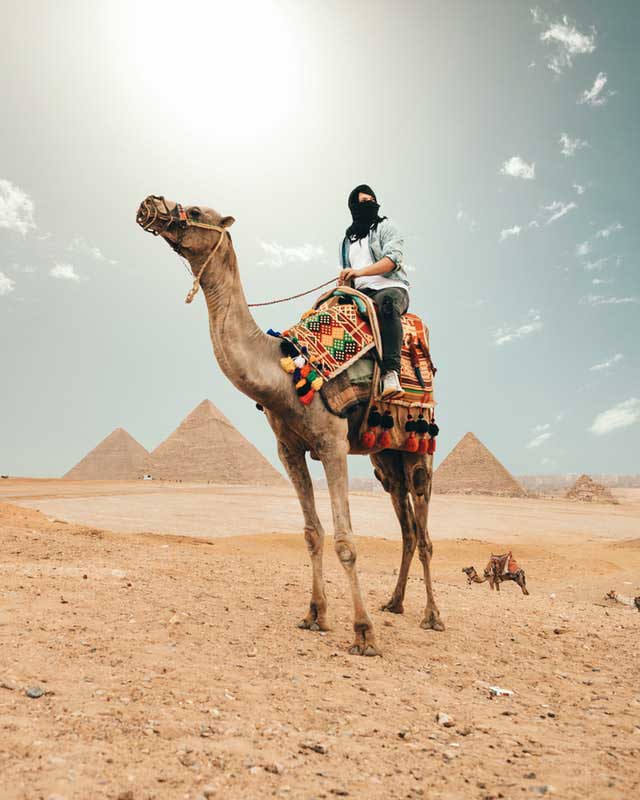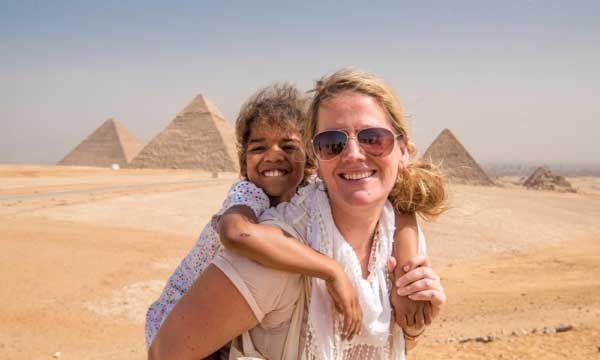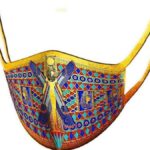Is it safe to travel to Egypt
Egypt is one of those places that you’ve always wanted to go to since you learned about the Great Pyramids in primary school or watched Brandon Fraser’s The Mummy. As ancient wonders go, Egypt is arguably at the top. Say “I’m off to Egypt” and everyone will know exactly why you want to go: the Sphinx, the Pyramids, the Nile, the deserts, the tea… You’ll find all of these and then some when you visit this country. It’s quite literally a cultural gem with thousands and thousands of years of history to learn about.

Is Egypt safe
Egypt’s reputation as a travel destination has taken some hits with travelers and travel professionals over the last several years, making some people wonder: Is it safe to travel to Egypt?
Yes, it is safe; it is very safe, You must understand that this is a country that had a revolution, and had some instability, and had an image that scared tourists, but it is much better and safer for tourists than it has been since the revolution and for many years previous to that.
This is a big country though. Taking certain precautions, i.e. only going to where it’s recommended to travel, is the best way to stay safe traveling in Egypt. The Valley of the Kings in Luxor, a boat trip on the Nile, various ancient wonders, and desert oases are still definitely on the agenda.
Is Egypt safe for solo female travelers
In some areas in Egypt, female travelers may feel uncomfortable when traveling. While violent assault and crime is relatively rare in Egypt, verbal harassment on the streets is common, and women are often specifically targeted if walking alone. Female travellers, especially if by themselves, can attract unwanted attention from men on the streets and have an increased chance of being followed, accosted and sometimes assaulted. If possible, travel in groups of three or more and stay to well-lit streets when on the move, and avoid going into the back room of a shop where you cannot see the street.
Egypt Travel Insurance
Do you need Travel Insurance for your trip to Egypt? Even if you’re only going for a few days, that’s more than enough time to get smote by wrathful angels. Have fun in Egypt, but take it from us, overseas medical care and canceled flights can be seriously expensive – insurance can, therefore, be a life-saver.
Local COVID-19 Measures in Egypt
Once you’re in Egypt, here are the government-mandated rules.
- Mandatory to wear a mask in public. You may be denied entry to vehicles and public transport if you don’t have one.
- Hotels have resumed operations and must follow new health and safety guidelines including limits on capacity and hygiene standards.
- There are restrictions on public gatherings but in general, it’s best to avoid these.
Safety Tips for Travelling Smoothly in Egypt
Here are some of our tips before visiting Egypt;
- Keep copies of your identification with you – You’ll probably have to show these, and losing your passport isn’t fun.
- Get a sim card – They’re cheap and relatively available.
- GO WITH SOMEONE WHO KNOWS EGYPT, You may only go to Egypt once in your life – you owe it to yourself to see it with someone who really understands it, who speaks English well enough to explain it to you. If that seems costly, he explains that seeing it right means you may not need to come back and see it again – though he certainly encourages you to
- TAKE SCHEDULED TOURS OF MAJOR ATTRACTIONS, One reason why we recommends seeing Egypt with a reputable tour operator is that admissions to major attractions like the Pyramids, Luxor, and Abu Simbel can be squared away before arriving at the destination.
- LISTEN TO THE STATE DEPARTMENT, the State Department has rated Egypt as a level-two (exercise increased caution) country. Illustration of countries with level two travel warning: This is the same level as European countries, like Spain, France, Italy, and the United Kingdom, meaning the threats are more long-term and less immediate.
- It can sometimes be confusing to understand whether a standard admission to the pyramids also includes admission to the passageways inside the pyramids (note: it doesn’t).
- Safety in public places; When travelling around markets, especially at night, be wary of pickpockets and petty crime, as this is often a problem in Egypt’s public spaces. Leave your valuables at home or securely locked in your hotel safe and only bring the amount of cash you will need for the day.
- LGBT travellers should be careful with public displays of affection – It will more than likely attract the wrong type of attention and remains a very sensitive subject for Egyptians.
- Learn a bit of Arabic – Not just to talk, but reading numbers and a few basic words in Egyptian Arabic helps, too.
- GET A VISA; An Egyptian visa is $25 U.S. cash. If you don’t have cash, hit the ATM. You can buy your visa right at the airport. Stick it in your passport as soon as you get it to avoid getting kicked to the back of the customs-and-immigration line.
- PREPARE FOR THE SUN – It’s one of the most consistently sunny countries in the world, so stay out of the sun when it’s at its hottest. Keep a good water bottle on you!
- Keep enough small change with you for tips – Drivers, guides, anybody; it’s a cultural practice to tip.
- Dress appropriately – This is a conservative country. You’ll notice most people, even men, cover-up. Be discrete and respectful.
- Protect against mosquitoes – Bring repellent and cover-up at dawn/dusk. There’s no malaria, but these guys are EVERYWHERE.
- Don’t be stupid in front of armed security – ANYTHING that looks suspicious could get you in very, very big trouble.
- And don’t take photos of military installations or public buildings – It is strictly prohibited. People have even been arrested for taking pictures of train stations.
- Don’t use a drone – It could seem VERY shady to people in charge, even if you’re just doing something for your blog. It’s also prohibited without the right authorisation, anyway.
- Ignore people who say they know you – “Hello my friend, I know you from the hotel, come this way.” Ignore politely.
- WATCH FOR PICKPOCKETS AND PURSE-SNATCHERS IN BIG CITIES, Egypt is nearly crime-free; as Lonely Planet notes, “The incidence of crime, violent or otherwise, in Egypt is negligible compared with many Western countries, and you’re generally safe walking around day or night.” Most crime is petty theft, with little violent crime. Still, you need to keep alert when walking through densely populated areas of Cairo or Alexandria, just as you would in other large urban areas around the world.
- Keep your bags close to you – Bag snatching is on the rise in certain areas.
- Be vigilant of your belongings in general – Pickpockets are also around. Not extensively, but they’re still there. Have a good money belt to protect your cash.
- Don’t get wrapped up in large, chaotic crowds – Cases of rape, sexual assault, and violence during mobs are not uncommon.
- Heading out on a diving tour? Make sure the reviews are good – Cheap does NOT mean good. Thorough research will be needed.
- Wear a crash helmet if you take out a quad bike – Safety standards vary, so ask for a helmet if one is not provided. Check to make sure the bike isn’t scrap.
- Don’t drink alcohol on the street – Or anywhere that isn’t a bar or a licensed restaurant. You could get arrested otherwise.
- DON’T TAKE DRUGS – Long prison sentences, the death penalty; yep, there’s pretty much no point.
- Unexploded landmines are present – Zones are usually marked, behind barbed fences and such, but ask for local advice. Northwest Egypt near Alamein, stretches of the Mediterranean coast near Marsa Matruh, and some of the Red Sea Coast are known hot spots.
- Lock valuables inside the safe in your room – If you have one, might as well use it.
- MAKE YOUR PLANS EARLY; You can tell when a country has become safe and stable when daily flights resume, There are now flights from the U.S. to Cairo on all European, American, and African airlines. Egypt Air also has connections to all in-country destinations like Luxor, Alexandria, and Sharm el-Sheikh – but they are all full.
- ENJOY THE SAHARA, BUT BE CAREFUL; The Egyptian Sahara occupies more than half the country, but it’s not just one huge sea of sand. There’s the Western Desert (which contains the White and Black Deserts), the Eastern Desert, the Great Sand Sea, and the Sinai Desert – all beautiful in their own ways. The Sahara is vast and spectacular, but it can also be dangerous for an inexperienced traveler. If you plan on doing more than just dipping your toe in the sand, take a tour or hire an experienced guide.
- EXERCISE MODESTY; Egypt is a Muslim country. As a result, the British government advises travelers, “Dress modestly, especially in rural areas, mosques and souqs (markets). Women’s clothes should cover the legs and upper arms. Men should cover their chests. Public displays of affection are frowned upon.” Also, alcohol consumption is banned outside of licensed bars and restaurants.
- Female solo travelers should not talk with taxi drivers to exchange basic pleasantries, and women should always sit in the back seat of a taxi.
- PRACTICE TAXI ETIQUETTE; According to the State Department, foreigners can occasionally be taken for a ride (so to speak) by Egyptian taxi drivers who claim their meter is broken. Know the going rate for a taxi ride before you get in a cab, and hold firm on your price.
- EXPECT SOME WILD TRAFFIC; Here’s another reason why you might want to stick to tour buses: Driving around Cairo is insane. A 30-minute trip might take three hours, and when traffic does move, it moves – at a frantic, lawless pace. The best description of Egyptian traffic comes from the U.S. State Department, which does not usually expound at length about traffic safety. It notes that: Egypt has one of the world’s highest occurrences of road fatalities. Traffic rules are often ignored and occasionally enforced. This can mean:
- Poorly marked roads
- Cars driving at night without headlights
- Cars driving the wrong way on one-way streets
- Pedestrians and animals in the road
- There are few alternatives to driving around Cairo outside of the metro, which is specifically not recommended by the State Department. Your best choices outside of the tour bus: fly when you can and if you must drive, hire an experienced local through your hotel.
If you follow these simple tips, your trip to Egypt will be the trip of a lifetime.
Enjoy your Egyptian vacation, and if you have questions on how travel insurance can help protect you when you travel to Egypt, consult our handy guide here.








